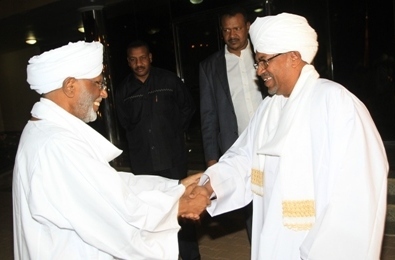Sudan’s PCP says no regrets for joining national dialogue, blasts Saudi role in the region
October 5, 2014 (KHARTOUM) – The Popular Congress Party (PCP) led by Islamist figure Hassan al-Turabi reiterated its commitment to the national dialogue process launched by president Omer Hassan al-Bashir last January and emphasized that it has no regrets for doing so.

Rahma added that his party will utilize its relations with the rebels for the sake of Sudan’s stability.
Bashir’s dialogue initiative faced major setbacks following the withdrawal of the National Umma Party (NUP) and boycott of leftist forces and rebel groups.
The decision of the PCP to join the dialogue without preconditions led, according to well placed sources, to sharp differences between party leaders and mid-level figures who expressed reservations on the party’s decision to abandon opposition ranks and engage in dialogue.
The PCP Political Secretary Kamal Omer told party supporters at Turabi’s residence on Sunday that they should not feel ashamed of evangelizing dialogue and warned that their decision regarding dialogue is a strategic one that they will not back away from.
He stressed that his party is determined to support all dialogue steps by deploying relationships it has with other powers to reach solutions that would uphold democracy and peace.
Omer pointed out that his party would not participate in creating new crises in Sudan, but is committed to finding a solution to the major issues and working with the forces of society.
He slammed opposition forces that rejected dialogue and said that these parties wanted to force their agenda, postpone elections and initiate a transitional period that would last more than ten years, adding that the PCP proposed only a one-year timeframe for the transitional period.
Omer further asserted that some of these opposition parties have problems with democracy that brings Islamists to power.
He claimed that opposition forces replaced slogans during the protests that broke out in September 2013, with ones that attack Islamists and political Islam, adding that this caused PCP to refrain from participating in these demonstrations.
The PCP official said that his party objected to the Paris Declaration signed between the NUP and the Sudan Revolutionary Front (SRF) because it drew a third way for national dialogue but said that the accord can nonetheless contribute to repairing and rebuilding of trust between rebels and other political forces.
He rejected president Bashir’s requirement that NUP leader al-Sadiq al-Mahdi distance himself from the Paris Declaration in order for him to be able to return to the country.
Bashir said that Paris Declaration makes al-Mahdi complicit in the rebel scheme to bring down the regime by force.
Hours after Bashir’s statements the National Intelligence and Security Services (NISS) announced its intention to sue al-Mahdi for his participation in “activities against the country”.
“The president has no right to prevent al-Sadiq from returning to the country because the Paris paper is a political one and if the president wants to respond to what al-Mahdi has done, he has to respond through a political paper,” Omer said.
He also renewed the PCP’s position of refusing to contest in the 2015 elections under the current conditions, stressing that the electoral law should be agreed to by all political components as well as agreeing on a transitional National Assembly and a President to manage the transitional period.
SAUDI ARABIA BEHIND INSTABILITY
In conjunction with the announcement of Khartoum that it is undertaking steps to normalize relations with Riyadh following this week’s talks between Bashir and Saudi Crown Prince, the PCP official slammed Saudi rulers and said they are behind all the current turmoil in Yemen.
He also stressed the need to emulate the Tunisian experience, saying that Tunisian President Moncef Marzouki is better than Saudi Arabian king.
Omer also accused Riyadh of seriously seeking to eradicate political Islam.
Al-Alam news channel TV quoted Turabi on Saturday as saying during Eid sermon that Khartoum rushed to Riyadh after the closure of the Iranian cultural centers last month in hope of getting Saudi support.
(ST)
